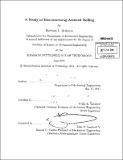A study of electrowetting-assisted boiling
Author(s)
Bralower, Harrison L. (Harrison Louis)
DownloadFull printable version (7.858Mb)
Other Contributors
Massachusetts Institute of Technology. Dept. of Mechanical Engineering.
Advisor
Kripa K. Varanasi.
Terms of use
Metadata
Show full item recordAbstract
The classical theory of boiling heat transfer based on bubble dynamics is explained and includes a full derivation of the Rohsenow boiling correlation. An alternative, more accurate correlation for determining boiling heat transfer coefficients is then presented. The theory of DC and AC electrowetting is described along with electrolyis and electric breakdown, two common problems in successfully demonstrating electrowetting. Next, the construction of a 1000V DC power supply for electrowetting experiments is outlined along with failed and successful attempts to create surfaces that exhibit electrowetting. The design and construction of an electrowetting-compatible boiling apparatus capable of delivering up to 1000W of power to a 400mm2 sample is also detailed. The power supply, surfaces, and boiler are used to determine that while electrowetting increases surface wettability it also severely decreases heat transfer, disproving the initial hypothesis. Heat transfer per unit superheat, represented by the dimensionless ratio of the Nusselt number to the Jakob number, is found to increase as a double exponential with decay constants 0.23 ± 0.21 and -14.82 ± 49.69 as a function of the dimensionless electrowetting number, a measure of electrical energy to surface energy of a liquid. Likewise, thermal resistance as a function of the electrowetting number is found to increase as a double exponential with rise constants -37.95 ± 214.4 and -0.32 ± 2.23.
Description
Thesis (S.B.)--Massachusetts Institute of Technology, Dept. of Mechanical Engineering, 2011. Cataloged from PDF version of thesis. Includes bibliographical references (p. 47).
Date issued
2011Department
Massachusetts Institute of Technology. Department of Mechanical EngineeringPublisher
Massachusetts Institute of Technology
Keywords
Mechanical Engineering.